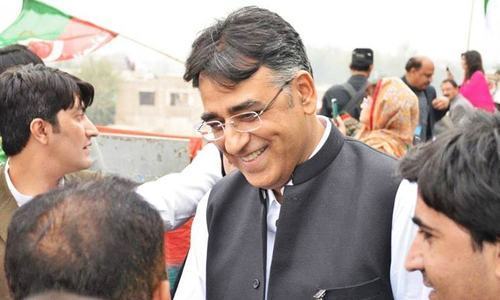ISLAMABAD: The International Monetary Fund (IMF) has asked the government to raise more revenues and pay greater attention to outstanding structural reforms, especially regarding the state-owned enterprises, to put the economy on a sound footing.
A visiting delegation of the fund led by Harald Finger, IMF’s mission chief for Pakistan, held detailed meetings with senior officials of the Ministry of Finance and Federal Board of Revenue on Monday as they entered the last leg of their weeklong engagements. The finance secretary and the FBR chairman led the official side. The talks will now enter the policy area where Finance Minister Asad Umar is expected to lead the government’s side.
Informed sources said the IMF staff mission had expressed reservations over the revenue measures of the supplementary budget. They argued that these measures were not enough to keep the fiscal deficit within the target of 5.1 per cent.
The sources said the mission viewed that dependence on provincial cash surpluses worth Rs286 billion and some additional subsidy elements not incorporated in the revised budgetary projections could cause slippages. On the external sector also, the IMF wanted the government to keep an eye on rising international oil prices and global economic conditions that are not encouraging for exports. The sources said the government was relying heavily on its engagements with some “friends” in the hope that they could provide reasonable breathing space for the very short term and help push any approach to the IMF past its 100 days mark.
Fund’s mission tells govt revenue measures of supplementary budget not enough to keep fiscal deficit within target of 5.1pc
“It is not the money as much as the credibility that we need the IMF for,” an official said, adding that the credibility was necessary for development partners and international capital markets to feel comfortable with Pakistan. He expects an approach no sooner than December. “At the moment there is no plan for an approach to the IMF.”
The official said the IMF team gathered voluminous amounts of economic data from various ministries and departments, including the FBR and the State Bank of Pakistan, and would conclude its visit on Oct 4.
It has completed consultative sessions on macroeconomic indicators, particularly the most challenging energy-sector problems, details of the China-Pakistan Economic Corridor (CPEC) and the PTI government’s plans for structural reforms, including privatisation of bleeding public-sector enterprises like Pakistan Steel, PIA, two gas utilities, gas producers — OGDCL and PPL — and power sector entities.
The authorities have shared with the IMF the latest data on new power sector arrears and its breakdown, including line losses, non-recoveries, refunds held by the tax authorities on account of GST, accrued mark-up on non-payments on the one side and loan repayments and rollovers on the other, and reasons for delays in tariff notification due to litigation.
The government has also briefed the IMF mission about the five-year $45bn strategic trade policy framework ending 2023 to be presented to the federal cabinet over the next couple of weeks to improve competitiveness and access to raw materials. Exemption to export industries from recent gas price increase was one step in that direction, while these sectors would also be given maximum protection in upcoming power tariff revisions.
Published in Dawn, October 2nd, 2018














































